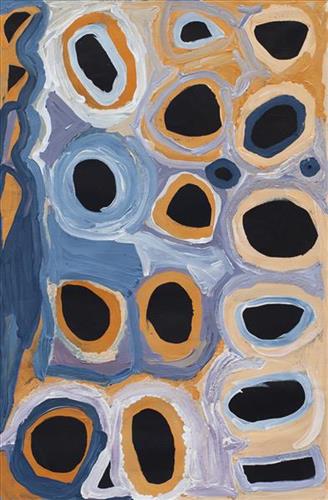111581958016
Jila (snake, living water)
“Snake lives there in the salt and comes from Mandora – inside the salt, and travels underground. Hide him out and goes underneath in the direction of the spring country from Mandora and Bidgydanga, in the direction of the coast. He is underground, same like jila[snake]. You are not allowed to dig that place or come close to the clay pans cause it’s the snake, the snake will eat you. He will come up and you will have to run, he will send the wind to drag you back in his ngurra. You can make a waru[fire] and he will go back into his home. Creek going this side salt on the other. Old line, that rabbit proof fence. This country follows that line, we use to follow that line from Punmu.”
– Biddy Bunnawarrie
The Western Desert term jila is used interchangeably to describe springs considered to be ‘living’ waters and snakes, both of which play a central role in Martu culture and Jukurrpa (Dreaming).
During the pujiman (traditional, desert dwelling) period, knowledge of water sources was critical for survival, and today Martu Country is still defined in terms of the location of water sources. Of the many permanent springs in Martu Country, very few are ‘living waters’; waters inhabited by jila (powerful ancestral beings). Before they became snakes, these beings were men who made rain, formed the land and introduced cultural practices like ceremonies and ritual songs. Some of the men travelled the desert together, visiting one another, but they all ended their journeys at their chosen spring alone, transformed into a snake. These important springs are named after their jila inhabitant, guarding their waters.
Some of the jila snakes are known by Martu as quiet and benevolent, others as dangerous and ‘cheeky’. Regardless of the nature of the inhabitant snake, jila sites must be entered respectfully; particular rituals are practiced, such as lighting fires, sweeping the ground with branches, approaching in single file, and calling out to the site’s jila to announce one’s arrival and introduce people who are new to the jila. Those who do not follow these guidelines are in danger of becoming sick, or even being killed.




